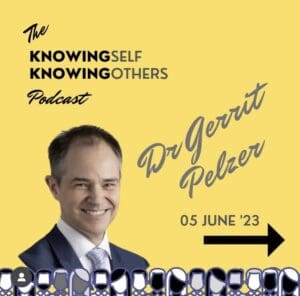In Episode 22 I spoke to Dr Gerrit Pelzer, executive coach and host of Second Crack – The Leadership Podcast. Here are my Top Takeaways frI’m out discussion…..
There is no one, agreed-upon definition of self-awareness or self. There is no identified part of the brain which is the source of the self. Self is is our response to our internal and external world, which is always changing. The idea of the isolated self is an illusion, because we’re all connected – the air we breathe is impacted by the plants around us, plants create the food we consume, our food impacts our gut bacteria, which impacts how we feel and on and on the connections go. The self is a perception not a fact.

In the corporate world, emotions are thought of as fuzzy, nebulous ideas, but our neurological impulses impact our emotions which impact our behaviour which impact whether we succeed or fail in the corporate world. So maybe, emotions aren’t that fuzzy after all!
Soft Skills through the lens of hard science ‘Brains Brought into the Business”
We generally think of experiencing the world through the five senses of touch, sound, sight, taste and smell. But we also have interception, the 6th sense, which are the internal signals that our body gives us about what it has perceived through neuroception – which is perception that happens beyond conscious thought, like that ‘gut feeling’ we get when something isn’t right. Pay more attention to the gut feeling to help you develop your self-awareness.
You have to be aware of what you want to change to be able to change it! If you don’t understand what you want to change you aren’t in a position to maximise your perception management potential. Gerrit’s description of perception aligns very closely with my definition of recognition: ‘an ability to recognise how the self is viewed and perceived by others’. Perception management is important to leaders who want to influence people, and self-awareness is critical to perception management.
Coaching is often supported and funded by organisations for those at the top of organisations, because that’s where they think they can have the biggest impact from their investment. But if we consider that leaders can be found at all levels of organisations, coaching has the potential to support and elevate people at all levels.
Perception management is a 360 degree activity. You might be responding to a situation in close proximity but your response might be perceived very differently by those observing you from a distance. Think about your reputation and how you are perceived – you don’t get a second change to make a first impression.
Four ways to develop your self-awareness: making time for self reflection and introspection (stop, pause and look deeply), direct you attention to your behaviours, patterns and triggers in the moment and in different situations, understanding how you are perceived by others, regulate your behaviours through practice, practice, practice

